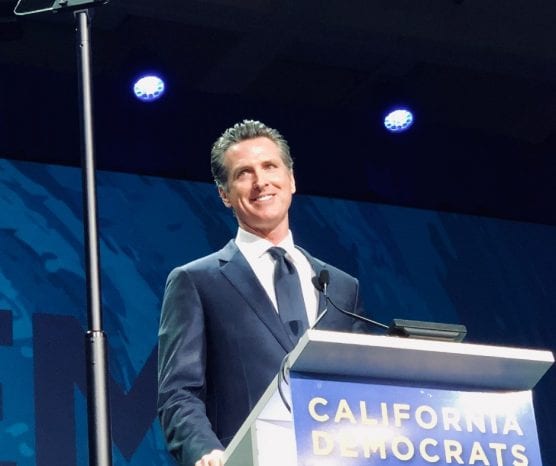SACRAMENTO – Building on the state’s historic investment in two years of free community college and substantial state budget investments that allowed the University of California and the California State University to freeze tuition, Governor Gavin Newsom signed a series of bills into law Friday focused on affordability, transparency and integrity in higher education.
The bills expand access to financial aid for students, strengthen integrity in college admissions and enhance oversight of for-profit colleges in California.
“Higher education has the power to transform lives, and all hardworking young people in our state deserve a shot at it,” Newsom said. “This package of bills strikes at the forces that keep the doors of opportunity closed to too many people in our state. Together, we’re improving affordability, transparency and integrity in higher education. I thank the Legislature for making this commitment to our students and our future.”
Increasing Financial Aid
Just days after being sworn in, Newsom proposed that the California budget provide for two years of community college tuition-free for first-time, full-time students by expanding the California College Promise program. The Legislature approved the Governor’s proposal over the summer, and the governor signed the legislation in June. The 2019-2020 state budget includes $42.6 million to support a second year of free tuition for approximately 33,000 students.
The budget also includes $41.8 million to increase the number of competitive Cal Grant scholarships and significantly increases funding for the University of California and California State University systems, facilitating tuition freezes and increased enrollment slots for the 2019-20 school year.
Additionally, the budget includes $50 million for child savings accounts that aid families in managing future higher education expenses, and assists student parents through $96.7 million provided to support the living expenses of those with dependent children, and by establishing or increasing Cal Grant Access Awards, a two-generation approach that will help students complete their education and increase their future earning potential.

The bills signed into law Friday include:
* AB 2 by Assemblymember Miguel Santiago (D-Los Angeles) expands access to the California College Promise Program by allowing students who are part of Disabled Students Programs and Services to qualify even if they are not enrolled in a full-time course load.
* AB 943 by Assemblymember David Chiu (D-San Francisco) authorizes the use of funding from the CCC Student Equity and Achievement Program for emergency student financial assistance to help students overcome unforeseen financial challenges that would prevent them from completing their course of study.
* AB 1278 by Assemblymember Jesse Gabriel (D-Encino) addresses housing and food insecurity and mental health by requiring CSU, CCC and UC campuses to include information about public services and programs including CalFresh, housing resources and mental health services on their student web portals.
* SB 150 by Senator Jim Beall (D-San Jose) relaxes the requirements and process for recipients of the Chafee Educational and Training Vouchers award, which provides financial aid to current and former foster youth enrolled in qualifying institutions of higher education.
* SB 354 by Senator Maria Elena Durazo (D-Los Angeles) expands eligibility for the California DREAM loan program to students enrolled in professional or graduate degree programs.
Integrity in College Admissions
Newsom signed three bills into law today addressing the college admissions scandal that rocked some of California’s universities earlier this year.
* AB 136 by Assemblywoman Sharon Quirk-Silva (D-Fullerton) prevents anyone found guilty in the admissions scandal from taking tax deductions for donations made to the charities involved.
* AB 697 by Assemblymember Philip Ting (D-San Francisco) requires the CSU Trustees, UC Regents, and the appropriate governing bodies of each independent institution of higher education, to report to the Legislature, whether their respective institutions provide any form of preferential treatment in admissions to applicants on the basis of their relationships to donors or alumni of the institution.
* AB 1383 by Assemblymember Kevin McCarty (D-Sacramento) strengthens the “admission by exception” system to require at least three campus administrators to approve admission for each applicant being considered for an exemption.
For-Profit College Accountability
To protect students against closures and poor outcomes at for-profit colleges, Newsom signed three bills that increase accountability and transparency.
* AB 1340 by Assemblymember David Chiu (D-San Francisco) will demonstrate whether for-profit institutions are effectively preparing students for the job market by requiring the Bureau for Private Postsecondary Education to calculate a debt-to-income ratio for both the for-profit institution and the programs they offer.
* AB 1344 by Assemblymember Rebecca Bauer-Kahan (D-Orinda) increases state oversight of out-of-state institutions that enroll California students in online programs – the largest share of which are for-profit colleges. The bill strengthens consumer protections by giving the Bureau for Private Postsecondary Education authority to place these institutions on a probationary status and revoke authorization to enroll California students if they do not comply.
* AB 1346 by Assemblymember Jose Medina (D-Riverside) helps students recover the true cost of their losses if their school closes while they are enrolled. It expands access to the Student Tuition Recovery Fund by allowing students to recover losses beyond tuition expenses, including housing, transportation, and child care, as well as any expenses incurred by the student as a result of the closed school, such as transcript fees or the cost of services related to debt relief.
Dual Enrollment
To expand dual-enrollment opportunities, the Governor signed three bills that allow K-12 and adult education students the opportunity to pursue their higher education goals.
* AB 30 by Assemblymember Chris Holden (D-Pasadena) removes barriers to dual enrollment by extending the College and Career Access Pathways program for an additional five years. The bill also simplifies the process for dual-enrollment applications and makes it easier for K-12 schools and community college districts to form partnerships.
* SB 554 by Senator Richard Roth (D-Riverside) provides a streamlined approach for adults enrolled in High School Equivalency programs to concurrently enroll in one or more community college course without tuition or fees.
* SB 586 by Senator Richard Roth (D-Riverside) requires the governing board of a school and community college district to consult with the appropriate local workforce development board to ensure their career technical education program is aligned with regional and statewide employment needs.
In total, the Governor signed the following higher education bills:
* AB 2 by Assemblymember Miguel Santiago (D-Los Angeles) – Community colleges: California College Promise.
* AB 30 by Assemblymember Chris Holden (D-Pasadena) – Community colleges: College and Career Access Pathways partnerships.
* AB 136 by Assemblymember Sharon Quirk-Silva (D-Fullerton) – Personal Income Tax Law: deductions: charitable contributions: business expenses.
* AB 463 by Assemblymember Sabrina Cervantes (D-Riverside) – Community colleges: faculty members: loan forgiveness.
* AB 540 by Assemblymember Monique Limόn (D-Santa Barbara) – Postsecondary education: student financial aid: California Dreamer Service Incentive Grant Program.
* AB 697 by Assemblymember Philip Ting (D-San Francisco) – Postsecondary education: reports: preferential treatment: students related to donors or alumni.
* AB 943 by Assemblymember David Chiu (D-San Francisco) – Community colleges: Student Equity and Achievement Program funds.
* AB 1090 by Assemblymember Jose Medina (D-Riverside) – Public postsecondary education: waiver of mandatory campus-based fees.
* AB 1278 by Assemblymember Jesse Gabriel (D-Encino) – Public postsecondary educational institutions: public services and programs: internet website notification.
* AB 1313 by Assemblymember Luz Rivas (D-Arleta) – Higher education: prohibited debt collection practices.
* AB 1340 by Assemblymember David Chiu (D-San Francisco) – Private postsecondary education: California Private Postsecondary Education Act of 2009: labor market outcome data reporting.
* AB 1344 by Assemblymember Rebecca Bauer-Kahan (D-Orinda) – Private postsecondary education: California Private Postsecondary Act of 2009.
* AB 1346 by Assemblymember Jose Medina (D-Riverside) – Postsecondary education: California Private Postsecondary Education Act of 2009: Student Tuition Recovery Fund.
* AB 1383 by Assemblymember Kevin McCarty (D-Sacramento) – Public postsecondary education: admission by exception.
* AB 1504 by Assemblymember Jose Medina (D-Riverside) – Community colleges: student representation fee: statewide community college student organization: goals.
* AB 1774 by Assemblymember Rob Bonta (D-Alameda) – Student financial aid: Student Aid Commission: extension of application deadlines.
* SB 150 by Senator Jim Beall (D-San Jose) – Student financial aid: Chafee grant awards.
* SB 354 by Senator Maria Elena Durazo (D-Los Angeles) – California DREAM Loan Program: graduate degree programs.
* SB 467 by Senator Bill Monning (D-Carmel) – Postsecondary education: cost-of-living categories.
* SB 554 by Senator Richard Roth (D-Riverside) – Public schools: adult school students: Advanced Scholastic and Vocational Training Program.
* SB 586 by Senator Richard Roth (D-Riverside) – College and Career Access Pathways partnerships.
To read the bills, click here and enter the bill number in the search field at top right.
Like this:
Like Loading...
Related





 Tweet This
Tweet This Facebook
Facebook Digg This
Digg This Bookmark
Bookmark Stumble
Stumble RSS
RSS































REAL NAMES ONLY: All posters must use their real individual or business name. This applies equally to Twitter account holders who use a nickname.
0 Comments
You can be the first one to leave a comment.